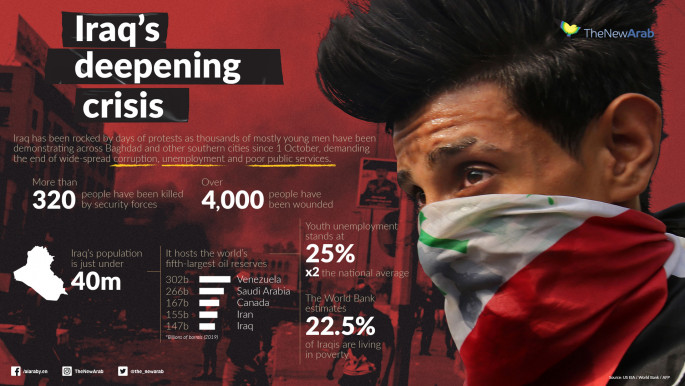Iraq protesters retake third bridge, block roads amid anti-corruption strike
Demonstrators retook control of half of Ahrar Bridge, which leads to the other side of the Tigris River near the heavily fortified Green Zone, the seat of Iraq's government. Security forces deployed on the other side of the bridge and erected concrete barriers to keep protesters from pushing into the area.
The bridge was the third retaken by protesters in recent days, after seizing part of Sinak Bridge and central Khilani Square the previous day following fierce clashes. They were also present in Jumhouriyya Bridge adjacent to Tahrir Square, the epicenter of the protest movement.
Iraq's security forces intensified their crackdown on dissent last week amid reports of an agreement between political factions to crush the protests and shore up the rule of Prime Minister Adel Abdul Mahdi.
At least 320 people have been killed and thousands wounded since the unrest in the capital and southern provinces began on October 1. Amnesty International has slammed the security forces for their alleged use of military-grade tear gas grenades at close range.
The protests erupted last month over widespread corruption, lack of job opportunities and poor basic services despite the country's oil wealth.
Bridges leading toward the Green Zone have been frequent flashpoints in the protests. Demonstrators had taken control of these bridges earlier this month but were later repelled when security forces launched their deadly crackdown.
Security forces withdrew from Khilani Square after firing live ammunition and tear gas against protesters trying to tear down a concrete barrier blocking entry to the square.
 |
| Protesters gather in Baghdad's Khilani Square [Getty] |
Demonstrators also took control of a five-story parking garage adjacent to the bridge, giving them a bird's eye view over the Green Zone and the street below, mirroring tactics employed in Tahrir Square, where they occupied an iconic 14-story Saddam Hussein-era building that has become a reference point for demonstrators.
Two people were wounded when security forces fired tear gas canisters in renewed confrontations on Baghdad's famous Rasheed Street, its oldest avenue and cultural centre known for its crumbling houses.
In the southern port city of Basra and in cities like Nasiriyah, Amara and Kut, protesters set tires ablaze to close off roads, keeping employees from reaching their work places amid activist calls for a general strike. Schools, universities and other institutions closed for the day, with hundreds of students taking part in the strike in Baghdad.
In parts of the capital, particularly the sprawling Sadr City neighborhood, protesters sat in the middle of the streets to prevent employees from getting to their workplaces. They also blocked roads with motorcycles and tuk-tuks.
"There will be no offices open until the last corrupt person is removed," one protester said, declining to be identified for security reasons. "Only then we will pull out from here."
The roadblocks are partly in response to a call by influential Shia cleric Muqtada al-Sadr for a voluntary strike to keep up the pressure on politicians.
NATO's Iraq chief decried the violence against protesters on Sunday at the close of his year-long mandate.
Speaking to AFP, Canadian Major General Dany Fortin called the events an "absolute tragedy".
Follow us on Twitter and Instagram to stay connected





 Follow the Middle East's top stories in English at The New Arab on Google News
Follow the Middle East's top stories in English at The New Arab on Google News


